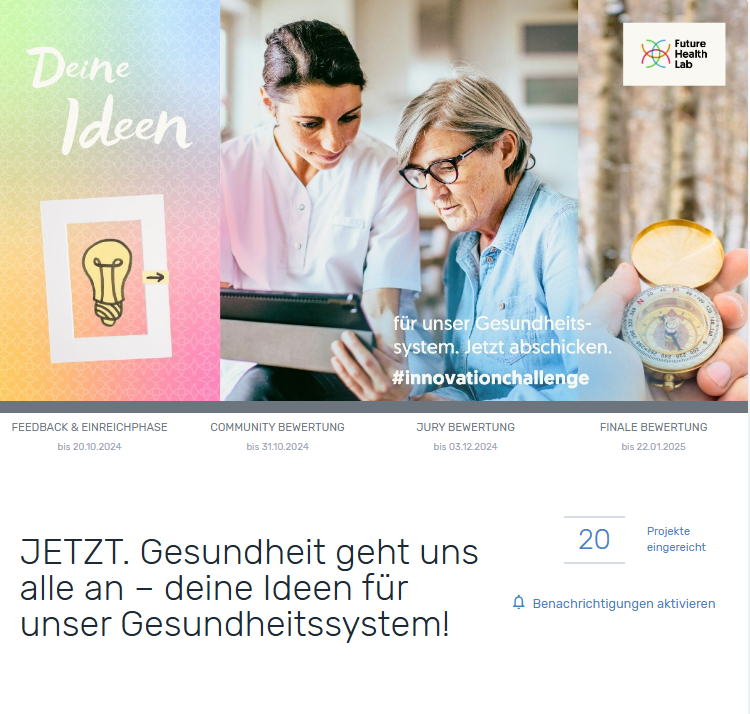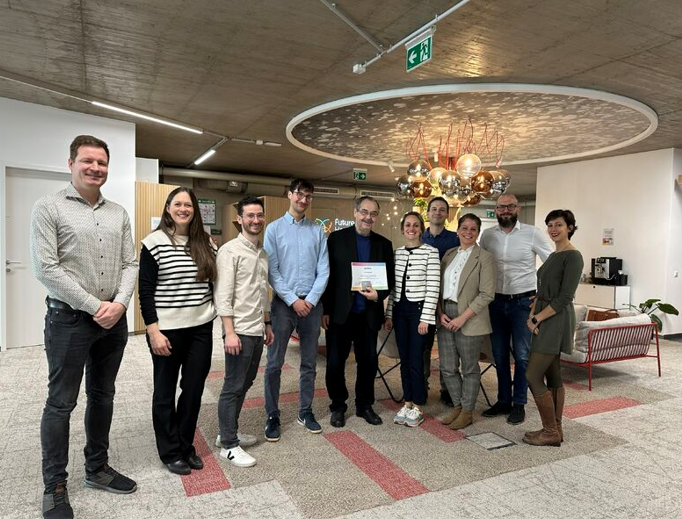Customer: Future Health Lab GmbH
CiMo Partner: 1000×1000 Crowdfunding GmbH (ISN GmbH / Crowd in Motion EDIH)
Challenge
The Austrian healthcare system is complex and characterized by diverse responsibilities and conflicting interests. Key stakeholders, including the federal government, states, and social insurance, are working towards strategic health policy goals, such as the “digital before ambulatory before stationary” approach. However, there is a lack of citizen participation in healthcare decision-making, which is predominantly driven by experts. This gap hinders the development of patient-centric solutions and limits the potential for innovative ideas from the public. The challenge was to create a platform that enables targeted dialogue and cross-sector exchange, empowering citizens to contribute to healthcare innovation.
Methods
The project was carried out through a structured approach that included digital, hybrid, and collaborative elements. The Future Health Lab (FHL) launched an online ideation campaign to gather innovative ideas from the public. The campaign involved several key steps:
- Specifying the Participation Process: The FHL defined the thematic focus and identified the target audience. This included specifying the goals, the scope of the campaign, and the criteria for evaluating the ideas.
- Promoting the Campaign: The campaign was promoted through various channels, including social media, email newsletters, and partnerships with key stakeholders. The FHL also engaged with lead users who were briefed on the campaign and encouraged to participate.
- Guiding Participants: The FHL provided guidelines and support to participants, helping them understand the submission process and the evaluation criteria. This included hosting workshops and providing online resources.
- Evaluating Ideas: The ideas submitted were evaluated by a jury of experts, who assessed them based on predefined criteria such as innovation, feasibility, and impact. The jury included representatives from the public sector, private sector, and academia.
- Selecting Winning Ideas: The top ideas were selected and recognized with awards and support for further development. The winning ideas included a digital medication blistering system, a wait time countdown app, and a multilingual support system for the healthcare hotline 1450.
- Follow-Up Activities: The FHL planned follow-up activities to support the development of the winning ideas, including networking events, workshops, and access to resources and expertise.
The project utilized digital tools and platforms to facilitate the participation process, ensuring that the campaign was accessible and inclusive. The hybrid approach allowed for both online and offline engagement, maximizing the reach and impact of the campaign. The collaborative elements involved engaging with key stakeholders and partners, fostering a sense of community and shared responsibility.

Result
The campaign resulted in a diverse range of innovative ideas that addressed various aspects of the healthcare system. Four winning ideas were selected, each receiving recognition and support for further development. The winning ideas included:
- Medikamentenverblisterung: A digital medication blistering system to help elderly patients manage their medications, reducing medication errors and relieving caregivers. This IT-supported solution enables older individuals to take their medications independently and safely, integrating ELGA for emergency access and incorporating experiences from stationary care. A pilot project in mobile care is currently being implemented as part of bachelor’s and master’s theses.
- Wartezeit-Countdown-App: An app that provides patients with real-time wait time information, improving their experience and allowing them to plan their visits more effectively.
- Sprachvielfalt bei 1450: A multilingual support system for the healthcare hotline 1450, making it more accessible to diverse populations.
- Innovativste Idee: The most innovative idea, which addressed a unique challenge in the healthcare system.
Additionally, the campaign provided valuable insights into the willingness of the public to participate in healthcare innovation. The engagement with the community helped build trust and foster a sense of ownership among participants. The campaign also positioned the FHL as a leader in digital health innovation, attracting further partnerships and funding opportunities. The success of the campaign has paved the way for future projects that aim to integrate public input into healthcare policy and practice.
The platform enabled targeted dialogue and cross-sector exchange, facilitating the development of innovative solutions. The project created strong foundations for future developments, demonstrating the value of crowdsourcing in healthcare innovation. Although participation was selective, contributions displayed remarkable depth and practical applicability, highlighting the potential for further regional innovation.
